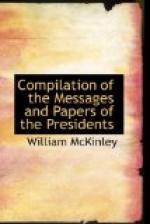Theodore Roosevelt.
White house, Washington, May 12, 1902.
To the Senate and House of Representatives:
One of the greatest calamities in history has fallen upon our neighboring island of Martinique. The consul of the United States at Guadeloupe has telegraphed from Fort de France, under date of yesterday, that the disaster is complete; that the city of St. Pierre has ceased to exist; and that the American consul and his family have perished. He is informed that 30,000 people have lost their lives and that 50,000 are homeless and hungry; that there is urgent need of all kinds of provisions, and that the visit of vessels for the work of supply and rescue is imperatively required.
The Government of France, while expressing their thanks for the marks of sympathy which have reached them from America, inform us that Fort de France and the entire island of Martinique are still threatened. They therefore request that, for the purpose of rescuing the people who are in such deadly peril and threatened with starvation, the Government of the United States may send, as soon as possible, the means of transporting them from the stricken island. The island of St. Vincent and, perhaps, others in that region are also seriously menaced by the calamity which has taken so appalling a form in Martinique.
I have directed the departments of the Treasury, of War, and of the Navy to take such measures for the relief of these stricken people as lies within the Executive discretion, and I earnestly commend this case of unexampled disaster to the generous consideration of the Congress. For this purpose I recommend that an appropriation of $500,000 be made, to be immediately available.
Theodore Roosevelt.
White house, June 13, 1902.
To the Senate and House of Representatives:
I deem it important before the adjournment of the present session of Congress to call attention to the following expressions in the message which in the discharge of the duty imposed upon me by the Constitution I sent to Congress on the first Tuesday of December last:
Elsewhere I have discussed the question of reciprocity. In the case of Cuba, however, there are weighty reasons of morality and of national interest why the policy should be held to have a peculiar application, and I most earnestly ask your attention to the wisdom, indeed to the vital need, of providing for a substantial reduction in the tariff duties on Cuban imports into the United States. Cuba has in her Constitution affirmed what we desired, that she should stand, in international matters, in closer and more friendly relations with us than with any other power; and we are bound by every consideration of honor and expediency to pass commercial measures in the interest of her material well being.
This recommendation was merely giving practical effect to President McKinley’s words, when, in his messages of December 5, 1898, and December 5, 1899, he wrote:




